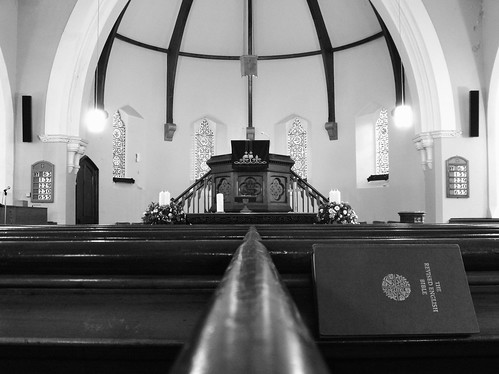Daily reflection and inspiration from the "Prince of Preachers," Charles Haddon Spurgeon.
Showing posts with label Bible. Show all posts
Showing posts with label Bible. Show all posts
Saturday, November 1, 2014
My Faith Stands Upon His Word
When the winds are out, and the storms are loosed, and temptation howls through the soul, we always fly to the Word of God and not to our own experience: we get away from what we feel to what the Lord has said. One ounce, of "it is written," gives more confidence than a ton of what we have felt. We are apt in troublous times to judge that our happy feeling was a delusion, and our confidence a mistake. “True, I did think that I stood and looked within the pearly gates, and was full of heavenly joy; but, alas, it may have been all a dream.”
This is, however, no dream - that Jesus Christ came into the world to save sinners - there is no mistake about that fact, That God has set forth his Son to be a propitiation for sin - there is no imagination about that. There it stands in black and white in the Scriptures of truth, and to that witness we fly again. Whether I am saint or sinner, whether I am an heir of heaven or an heir of wrath, there standeth the word, “He that believeth in him is not condemned.” I do believe in him, and I am not condemned, nor shall all the devils in hell make me think I am, since God has said I am not. On that rock my faith shall stand unshaken, come what may.
From a sermon by Charles Haddon Spurgeon entitled "The True Position Of The Witness Within," delivered August 11, 1878. Image by John Fowler on Flickr under Creative Commons License, without alteration.
Friday, October 31, 2014
The Way Back To Peace
We may, dear friends, have been so unwatchful as to have brought ourselves into this condition by actual faults of life and conduct. I would make it a matter of personal enquiry among you by asking thoughtful answers to a few questions. Have you restrained prayer? Do you wonder that the land grows dry? Has the word of God been neglected? Have you left off its study of late through pressure of other concerns? Do you wonder if you have left the streams that your soul thirsts? Have you been over much engaged in hunting after temporal gain, and has the hot simoom* of worldliness parched your heart? Has there been anything about your spiritual life that has grieved the Holy Spirit? Have you been idle as a Christian? Have you been content to eat the fat and drink the sweet, and to do nothing to win souls? Or have you while you have fed upon the word of God taken the sweet things of the gospel as a matter of course, and not blessed the Lord for them? Has there been a lack of humility or a deficiency of gratitude? If so, can you wonder that you are in a dry and thirsty land?
Have you been careless in your walk? In domestic life has sin been permitted in the family? Have you been winking at evil in your children? Have you permitted it in yourself? If so, remember it is written, “He turneth rivers into a wilderness, and water springs into dry ground, a fruitful land into barrenness, for the wickedness of them that dwell therein.” You may have fallen into a parched condition of spirit because you have forgotten him of whom in happier days you sang, “All my fresh springs are in thee.” Because you have walked contrary to God, God is walking contrary to you; and it is your duty to repent and return at once to your Lord; only by so doing will peace return unto you.
* - a hot, desert wind
From a sermon by Charles Haddon Spurgeon entitled "A Wilderness Cry," delivered August 4, 1878. Image by Stacy Manson on Flickr under Creative Commons License, without alteration.
Labels:
backsliding,
Bible,
Evangelical,
religion,
Spurgeon
Wednesday, October 1, 2014
Rest In The Promise Of God
And you, dear child of God, if you have a text of Scripture, a promise which evidently suits your case, which meets your trouble, do not say, “Whereby shall I know this?” When the Spirit says it, it is enough that it is in the word. Whatever the Scripture states, be sure of it; for if all the wise men in the world were to prove it, it would not be proven one bit more; and if they were all to disprove it, it would be none the less sure. If I were to see a thing to be true which God had declared in his word, I would not believe my eyes so well as I would believe his word: at least, I ought not to do so.
This is where we ought to stand: all the world may deceive, but God cannot; let God be true, and every man a liar. If you will come and trust him in this way you shall be like a tree planted by the rivers of water, your leaf shall not wither, and you shall not know when drought cometh. If your walk through life is the walk of faith, as Abraham’s and Enoch’s were, you shall have a grand life - grandly full, and eternal, and Christly; but if you doubt him you shall not be established. The unbeliever shall be as the rolling thing before the whirlwind, as the sear leaf that falleth from the tree, and as the heath of the desert that knoweth not when good cometh. May the Holy Ghost save us, brothers and sisters, from unbelief, and give us rest in the promise of God.
From a sermon by Charles Haddon Spurgeon entitled "A Distinction With A Difference." Image by Bryce Bradford on Flickr under Creative Commons License.
Labels:
Bible,
Christianity,
Christians,
Evangelical,
faith,
God,
religion,
Scripture,
Spurgeon,
unbelief
Saturday, September 20, 2014
Who Will Dare to Follow Christ?
The religion of Jesus Christ never was, nor ever can be, the religion of this present evil world. He has chosen a people out of the world who believe it, but the world itself has always hated it. Did not our Lord tell us (John 14:17), concerning the Spirit of truth, that the world cannot receive him, because it seeth him not, neither knoweth him?
Whenever you find a religion which unites itself with pomp and show and worldly power, if there be any truth in it at all, it has, at any rate, deteriorated from the standard of its purity, and is not according to the mind of Christ. But there are some who are so fond of everything that is fashionable - everything that is great and famous - that, if the Lord Jesus Christ be despised and rejected of men, they despise and reject him too. Ah, but I hope that I address some to whom the Lord has given a nobler spirit. Some men and women I hope are here to-night who will never reject the truth because it is unfashionable, or refuse to follow Christ because he is despised. No, but the noble spirit says, “Is it right? Then I will espouse it. Is it true? Then I will believe it in the name of God. Though it may mean poverty and shame, yet that is the side on which I will enlist.”
There is a lordlier chivalry than all the chivalry of war: it is the chivalry of the heart that dares be nailed to the cross with Christ sooner than turn aside to seek flowery pathways and follow the trail of the serpent. Yet many do reject Christ because of the humbleness of his exterior. Who is on the Lord’s side, and will dare avow it before a scoffing world?
From a sermon by Charles Haddon Spurgeon entitled "Offended With Christ." Image by seyed mostafa zamani on Flickr under Creative Commons License.
Labels:
Bible,
Christ,
Christianity,
Evangelical,
Jesus,
religion,
Spurgeon,
world
Thursday, September 26, 2013
The Knowledge We Seek
The Holy Ghost reveals Christ to us and in us. Whatsoever things Christ hath spoken while he was here, the Holy Ghost opens to the mind and to the understanding, and thus by speaking of Christ within us he carries on the work which our Lord began when here below. The Comforter is the instructor and Jesus is the lesson. I dare say you long to know a thousand things, but the main point of knowledge to be desired is Jesus himself. This was his teaching, and this is the Holy Spirit’s teaching, and this is the end and object of the Bible. Moses, Esaias, and all the prophets spake of him, and the things which are recorded in this book were written up that ye might believe that Jesus is the Christ, and that believing ye might have life through his name. Precious is this book, but its main preciousness lies in its revealing Jesus himself, it is the field which contains the pearl of great price, the casket which encloses heaven’s brightest jewel.
From a sermon by Charles Haddon Spurgeon entitled "The Jesus Christ Himself," delivered December 9, 1877. Image by Sacha Fernandez on Flickr under Creative Commons License.
Labels:
Bible,
Christ,
Christianity,
Holy Spirit,
knowledge,
religion,
Spurgeon
Saturday, September 14, 2013
Let Us Forget Our Weariness
Putting our hand to this plough and looking back will prove that we were unworthy of the kingdom. If there be a hundred reasons for giving up your work of faith, there are fifty thousand for going on with it. Though there are many arguments for fainting, there are far more arguments for persevering. Though we might be weary, and do sometimes feel so, let us wait upon the Lord and renew our strength, and we shall mount up with wings as eagles, forget our weariness, and be strong in the Lord and in the power of his might....
As the rain climbs not up to the skies, and the snow flakes never take to themselves wings to rise to heaven, so neither shall the word of God return unto him void, but it shall accomplish that which he pleases. We have not spent our strength in vain. Not a verse taught to a little girl, nor a text dropped into the ear of a careless boy, nor an earnest warning given to an obdurate young sinner, nor a loving farewell to one of the senior girls, shall be without some result or other to the glory of God. And, taking it all together as a mass, though this handful of seed may be eaten of the birds, and that other seed may die on the hard rock, yet, as a whole, the seed shall spring up in sufficient abundance to plentifully reward the sower and the giver of the seed. We know that our labor is not in vain in the Lord.
From a sermon by Charles Haddon Spurgeon entitled "The Cause and Cure of Weariness in Sabbath-School Teachers," delivered November 8, 1877. Image by Ada Be on Flickr under Creative Commons License.
Friday, June 14, 2013
A People Who Know The Truth
In the present age if any man can talk well he will get a following, whatever he may teach. I am astounded at some professors, who can hear this man to-day and that man the next, though the two are diametrically opposed. Surely there is some difference between truth and error, and mere cleverness cannot neutralize false doctrine. Our forefathers discerned between things that differed, and when false doctrine came before them they cast it out, notwithstanding the eloquence of its advocate. I do not want you to be bigots. God deliver us from their bitter spirit, but I do want you to be sound believers. There is a great difference between obstinate bigotry and a decided maintenance of that which we have believed. After all, what is the chaff to the wheat? There is a difference between the doctrines of men and the teachings of the Lord. No lie is of the truth. Garnish it as you may, it is still a lie. Oh to be rooted and grounded and built up in Christ! One of the most desirable things in this fickle age is to see around the minister of Christ a people who know the truth, and feel that the truth binds them fast to their God.
From a sermon by Charles Haddon Spurgeon entitled "Taking Hold Upon God," delivered October 7, 1877. Image by Jeff Pang on Flickr under Creative Commons License.
Thursday, March 7, 2013
The Sword Is Yours
We are armed with the word of God, not only that we may smite our own spiritual foes, but that we may win men for Christ. As the Israelites had to conquer Canaan, so have we to conquer the world for Jesus. Go ye up against the ramparts of error, go ye up against the hosts of evil, with no weapon in your hand but the story of the cross, the revelation of the Most High, the declaration of the gospel of Jesus, for by this sign we conquer; it is impossible that we should fail with the gospel in our hands. How happy God’s people ought to be when they think of this. Armed with an invincible weapon, ought we not to rejoice in anticipation of victory?
A man who has a Bible of his own - I mean not the paper and the letterpress, but all that is in the inspired volume, - is there anything more that he can desire? He finds from Genesis to Revelation every promise his, every dear assurance of almighty power and love all his own, what more doth he need? He who can use this two-edged sword may defy doubt, fear, anxiety, care, temptation, worldliness, yea, and death and the devil. At the very sight of this sword our adversaries tremble, for it cuts through joints and marrow, and leaves a deadly wound wherever it cuts. Be happy, Christian; the Lord help thee to be happy as thou seest this sword of the Spirit to be thine.
From a sermon by Charles Haddon Spurgeon entitled "Happiness The Privilege And Duty Of Christians," delivered June 10, 1877. Image by LenDog64 on Flickr under Creative Commons License.
Labels:
Bible,
Christ,
Christianity,
evangelism,
Gospel,
religion,
Spurgeon
Friday, February 15, 2013
Talk Of God's Wondrous Works
You cannot all preach, but you can all talk; and, if some preachers would refrain from rhetoric and tell their plain unvarnished tale, they would succeed better than they do now. Do you think that God meant his ministers to kill themselves in order come out on Sundays with one or two splendid displays of “intellect” and eloquence? Surely this is not God’s way of doing things. I do not believe that Paul ever preached a fine sermon, or that Peter ever dreamed of any display of intellect. I asked the other day of one who had heard a sermon if it was likely that sinners would be converted by it. He said, “Oh no; by no means; but it was an intellectual treat.” Is there anywhere in the Bible a word about intellectual treats, or anything approximating to such an idea?...
But the way for the Christian - the real Christian - is to talk of God’s wondrous works. Tell me the old, old story. Tell it not stately, but do tell it simply, as to a little child. More glory will come to God from that, more comfort to your soul in reflection, and more benefit to the souls of those you teach, than from all the flights of poetry or the flourishes of rounded periods.
From a sermon by Charles Haddon Spurgeon entitled "The Student's Prayer." Image by Charles Clegg on Flickr under Creative Commons License.
Labels:
Bible,
Christianity,
preaching,
religion,
Spurgeon
Thursday, September 20, 2012
Treasures Hidden in the Scriptures
Man’s books have usually far less in them than we expect, but the book of the Lord is full of surprises, it is a mass of light, a mountain of priceless revelations. We little know what yet lies hidden within the Scriptures. We know the form of sound words as the Lord has taught it to us, and by it we will abide, but there are inner store-houses into which we have not peered; chambers of revelation lit up with bright lamps, perhaps too bright for our eyes at this present. If Paul, when the Spirit of God rested upon him, could see so much in the songs of David, the day may come when we also shall see still more in the epistles of Paul, and wonder at ourselves that we did not understand better the things which the Holy Ghost has so freely spoken to us by the apostle. May we at this time be enabled to look deep and far, and behold the sublime glories of our risen Lord.
Labels:
Bible,
Christianity,
God,
Holy Spirit,
religion,
Spurgeon
Saturday, August 18, 2012
The Sinner's Savior
Gospel blessings are intended for those who have transgressed and are under condemnation, for who else would value forgiveness and justification? I know myself of no gospel for men who have not sinned. I know of no New Testament promises intended for those who have never broken the law; but I perceive all through the wondrous pages of the gospel that mercy’s eye and heart are set upon those who are guilty and self-condemned.
The Eternal Watcher is looking over the vast ocean of life, not that he may spy out the vessels which sail along proudly in safety, but that he may see those who are almost wrecks. “He looketh upon men, and if any say, I have sinned, and perverted that which was right, and it profiteth me not; he will deliver his soul from going into the pit, and his life shall see the light.” Our Lord was more moved at the sight of sickness than of health, and wrought his greatest wonders among fevers, leprosies, and palsies. This is the end and object of the gospel, namely, to save the unrighteous; the God of the gospel is he that “justifieth the ungodly,” “for when we were yet without strength, Christ died for the ungodly.” “God commendeth his love toward us, in that, while we were yet sinners, Christ died for us.”
From a sermon by Charles Haddon Spurgeon entitled "The Sinner's Savior," delivered October 1, 1876. Image by Jenny Downing on Flickr under Creative Commons License.
Labels:
Bible,
Christianity,
forgiveness,
Gospel,
New Testament,
religion,
sin,
sinners,
Spurgeon
Friday, June 22, 2012
Let us remember God's mercies towards us
What faults there are in our memory touching the work and word of God! Perhaps some of you have very powerful memories, and may be able to treasure up whole volumes as some have done. It might be said of you as it was of Dr. Lawson, that if the whole Bible had been destroyed, he could have reproduced it from memory. This is a great gift and a worthy use for it, but I fear that few of us have it. It is not likely that men could say of us as of the famous Grecian, that out of ten thousand soldiers he knew every one of his men by name. I do not find fault with short memories, but with good memories which are treacherous towards divine things. What I complain of is that memory may be very strong concerning self-interest, grievances, and trials, and yet towards God’s mercies it may be very weak.
From a sermon by Charles Haddon Spurgeon entitled "The Recorders," delivered June 25, 1876. Image by Ian Sane on Flickr under Creative Commons License.
Monday, April 23, 2012
What He says He means
Do you want to be saved? Believe God as you would believe the one that told you that your house was on fire. Believe God as you would believe your friend, believe him actively, really, truly, for that is faith. God tells you that you have trangressed against him, but that he wills not your death — that he has therefore sent his Son into the world to suffer in the stead of sinners, and that if you rely upon his Son you shall have immediate forgiveness and shall be saved. Believe that message. Believe it to be true. You ought to believe it, for God cannot lie.
It is an indisputable fact that whatever God says stands good. It is not contingent upon aught [i.e., anything] but his own will, and he is without variableness or shadow of turning, What he says he means. Believe him, then, whom ye have not seen as you would believe any one whom ye see daily. Give credit to the word he has written as you would credit any word that is spoken to you.
From a sermon by Charles Haddon Spurgeon entitled "A Remonstrance And A Rejoinder." Image by Zach Dischner on Flickr under Creative Commons License.
Friday, April 6, 2012
Sin was put away upon the tree
There was a time when we were parted from God; we were without God, being alienated from him by wicked works... He is of purer eyes than to behold iniquity, neither can evil dwell with him. That strict justice with which he rules the world requires that he should hide his face from a sinful generation. God who looks with complacency upon guilty men is not the God of the Bible, who is in multitudes of places set forth as burning with indignation against the wicked. “The wicked and him that loveth violence his soul hateth.”
But, now the sin which separated us from God has been put away by the blessed sacrifice of Christ upon the tree, and the righteousness, the absence of which must have caused a gulf between unrighteous man and righteous God, that righteousness, I say, has been found, for Jesus has brought in everlasting righteousness.
From a sermon by Charles Haddon Spurgeon entitled "," delivered. Image by Linda Cronin on Flickr under Creative Commons License.
Labels:
Bible,
Blood of Christ,
Christ,
Christianity,
God,
religion,
salvation,
sin,
Spurgeon
Monday, March 12, 2012
Let us not neglect His Word
God’s word is the soul’s manna and the soul’s water of life. How greatly we ought to prize each word of divine teaching. But, dear brethren, do you not think that many are very neglectful of God’s instructive voice? In the Bible we have precious doctrines, precious promises, precious precepts, and above all a precious Christ, and if a man would really live upon these choice things, he might rejoice with joy unspeakable and full of glory. But how often is the Bible left unread! And so God is not heard. He calls and we give no heed. As for the preaching of the Word when the Holy Spirit is in it, it is the “power of God unto salvation,” and the Lord is pleased by the foolishness of preaching to save them that believe; but all believers do not hear the voice of the Lord by his ministers as they should. There is much carping criticism, much coldness of heart, much glorying in man, and a great want of teachableness of spirit, and thus the word is shut out of our hearts. The Lord would fain teach us by his servants, but our ears are dull of hearing....
Search the Scriptures that no word from the Lord may be inadvertently slighted by you; hear the Word attentively and ponder it in your heart, and daily make this your prayer, “What I know not, teach thou me.” “Open thou mine eyes, that I may behold wondrous things out of thy law.” Let us strive against prejudice, and never let us dream that we are so wise that we need learn no more. Jesus Christ would have us be teachable as little children and ready to receive with meekness the engrafted word which is able to save our souls. You will have a blessed fellowship with your Lord if you will sit at his feet and receive his words.
From a sermon by Charles Haddon Spurgeon entitled "How To Converse With God," delivered. Image by bcanepa_photos on Flickr under Creative Commons License.
Labels:
Bible,
Christianity,
God,
Holy Spirit,
religion,
Spurgeon
Thursday, March 8, 2012
Let us go on to greater triumphs
David remembered that by confidence in God his energetic fighting gained the victory — the lion was killed, and the bear was killed too. And cannot you remember, brethren, what victories God gave you? When you were little in Israel and despised, yet his hand was upon you, and when few would bid you God speed, yet the Jehovah of Hosts encouraged your heart, and when you were feeble and but a youth, the Lord Jesus helped you to do exploits for him in your own way. Remember this, and be of good courage this morning in the conflict which now lies before you.
David talked of his former deeds somewhat reluctantly. I do not know that he had ever spoken of them before, and he did so on this occasion with the sole motive of glorifying God, and that he might be allowed to repeat them. He ravished for permission from Saul to confront the Philistine champion, and bring yet greater glory to God. Brethren, whenever you talk of what God enabled you to do, mind you lay the stress upon God’s enablings, and not upon your own doings; and when you rehearse the story of your early days, let it not be as a reason why you should now be exonerated from service, and be allowed to retire upon your laurels, but as an argument why you should now be allowed the most arduous and dangerous post in the battle.
Let the past be a stepping-stone to something higher, an incentive to nobler enterprise. On, on ye soldiers of the cross, in God’s name eclipse your former selves. As grace enabled you to pile the carcass of the bear upon the corpse of the lion, so now resolve that the Philistine shall increase the heap, and his head shall crown the whole, to the honor and glory of the God of Israel. So much for recollections. I pity the man who has none of them, and I pity yet more the man who having them is now afraid to risk all for his Lord.
From a sermon by Charles Haddon Spurgeon entitled "The Lion-Slayer - The Giant-Killer," delivered September 5, 1875. Image by Nigel Wedge on Flickr under Creative Commons License.
Saturday, March 3, 2012
Accept the testimony of God's Word
From a sermon by Charles Haddon Spurgeon entitled "The Priest Dispensed With," delivered August 15, 1875. Image by Satoru Kikuchi on Flickr under Creative Commons License.
Thursday, March 1, 2012
Be careful who becomes your guide
We must be all conscious that we imitate those whom we admire. Love has a strange influence over our nature, to mould it into the form beloved. A true disciple is like clay on the wheel, and his Master fashions him after his own image. We may be scarcely conscious of it, but we are most surely being conformed to the likeness of those to whose influence we submit ourselves.
Whoever then your Master may be, dear friend, you are changing into his image: if you choose to be led by the votary of pleasure, you will become more and more frivolous; if you admire the slave of avarice, you will become avaricious, if you feel the sway of the minion of vice, you will grow vicious yourself. If a man who despises the word of God becomes your hero, you will ere long despise it too: while men are gazing upon him with admiration, a kind of photography is going on, and you, like a sensitive plate, receive his image. I charge you, therefore, to be careful who becomes your guide.
From a sermon by Charles Haddon Spurgeon entitled "The Choice Of A Leader," delivered August 1, 1875. Image by Peggy2012CREATIVELENZ on Flickr under Creative Commons License.
Labels:
Bible,
Christianity,
discipleship,
God,
love,
religion,
Spurgeon
Saturday, January 28, 2012
The Sweetest Sounds
“I will behave myself wisely in a perfect way. O when wilt thou come unto me? I will walk within my house with a perfect heart.” — Psalm 101:2.
The hundredth psalm is perhaps the best known song of praise in the word of God. To sing the “Old Hundredth” has been a habit of worshippers from generation to generation — the custom of every succeeding age, as it is our custom still. “Make a joyful noise unto the Lord all ye lands.” Now, it is somewhat significant that the hundred-and-first, which immediately follows it, should be such a practical psalm, — all about how a man should walk in his house, how he should put away sin from his very eyes, and keep himself from evil companionship. What does it seem to teach us but this, that the best praise is purity, and that the best music in the world is holiness?
If we would extol the Lord, the best way to do it is to labor to keep his mind before us, and to walk in his commandments. The sweetest sounds that ever came from the heaving bellows or the organ pipes can never have so much melody in them as a life that is tuned to the example of Christ. If we obey, we praise. He singeth best who worketh best for God. There is no praise that excels that which is like the praise of angels, “who do his commandments, hearkening unto the voice of his word.”
From a sermon by Charles Haddon Spurgeon entitled "A Holy And Homely Resolve." Image by Paul Bica on Flickr under Creative Commons License.
Tuesday, January 10, 2012
The one who rightly handles the Word
I desire to handle the word of God so that no man may ever find an excuse in my ministry for his living without Christ, and living in sin, but may know clearly that sin is a deadly evil, and unbelief the sure destroyer of the soul. He has indeed been made to handle the word aright who plunges it like a two-edged sword into the very bowels of sin.
From a sermon by Charles Haddon Spurgeon entitled "Rightly Dividing The Word Of Truth," delivered December 27, 1874. Image by Rodrigo Soldon on Flickr under Creative Commons License.
Subscribe to:
Posts (Atom)



















